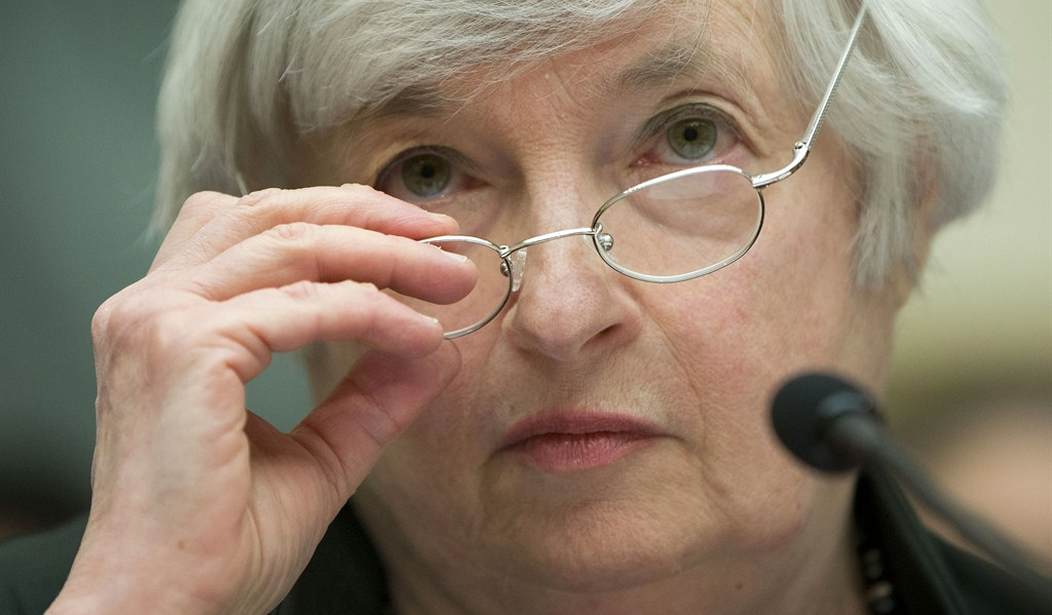Everyone, it seems, is worried about global economic stagnation.
And there is good reason to be concerned. Europe is in the doldrums. Japan is stagnant. The developing world is hampered by intervention,  corruption, and absence of property rights. And the United States is stumbling through an abnormally weak recovery.
corruption, and absence of property rights. And the United States is stumbling through an abnormally weak recovery.
But what’s the solution to this economic malaise?
The international economic policymaking elite seems to think easy money is the right elixir. The Wall Street Journaleditorial page is underwhelmed by this approach.
European Central Bank President Mario Draghi announced a plan to buy what amounts to €50 billion ($56.84 billion) a month in government bonds and other assets at least through September 2016 on top of the €10 billion the ECB already was buying through various programs.…This QE program is more a political than economic triumph. …someone has to point out—since the QE cheering section among the political and investor classes won’t—that Mr. Draghi himself warned in his press conference Thursday that quantitative easing by itself won’t revive stalling eurozone economies… Reforms that would displace entrenched interests, whether domestic businesses or unions, are hard for politicians to enact, while demanding easier money from the central bank is easy.
Unfortunately, the ECB’s easy-money policy will probably give politicians in national capitals further leeway to avoid real reforms.
Politicians should now get serious about reforms on the theory that the central bank has done what they want. Smaller, sicker European economies have no more monetary excuses for their failure to reform. Or at least we can dream. The likelier outcome is that to the extent quantitative easing drives down bond yields, it will reduce market pressure for reforms until another economic crisis or deflationary blip spurs calls for a QE expansion.
Recommended
Even folks that lean more to the left don’t think dumping more money into the economy will solve underlying problems.
Here are some excerpts from a David Ignatius column in the Washington Post.
A sign of the concern among business and political leaders here about sluggish economic growth is that one of the World Economic Forum sessions this week was titled “Avoiding a Centennial Slump” — meaning a downturn that lasts a hundred years. …The European Central Bank did the equivalent of pushing the panic button Thursday, announcing a bond-buying program of 1.1 trillion euros meant to lower interest rates and encourage investment. …But rates are already rock-bottom, and although the ECB’s “quantitative easing,” as it’s known, will flood Europe with cash, there’s no guarantee that it will be used to cure the region’s structural impediments to growth. Indeed, persistent low rates are one of the attributes of a deflationary economy, rather than a cure.
I largely disagree with the policies that Ignatius then proposes, but at least we generally agree that the European economy isn’t in the dumps because of inadequate liquidity.
The problem isn’t just in Europe. Like the ECB, the Federal Reserve also has tried to goose growth with easy-money policies.
 But that’s like pushing on a string. Maybe there are times that the financial system needs more liquidity, but folks shouldn’t labor under the impression that printing more money solves the structural problems caused by too much spending, too high taxes, and too onerous levels of regulation.
But that’s like pushing on a string. Maybe there are times that the financial system needs more liquidity, but folks shouldn’t labor under the impression that printing more money solves the structural problems caused by too much spending, too high taxes, and too onerous levels of regulation.
And it’s quite possible, of course, that easy-money policies actually undermine long-run prosperity by creating bubbles.
Though as this Chip Bok cartoon illustrates, Wall Street enjoys bubbles, at least when they’re expanding.
P.S. Since I cited a Washington Post columnist who’s attending the World Economic Forum in Davos, Switzerland, this is a good opportunity to share some excerpts from a column Dan Hannan wrote for CapX.
As you can see, he’s not a big fan.
Davos is a place where powerful people pick up consultancies and directorships and international posts. Left-wingers rightly resent this. What they see, in Marxist terms, is a gang of rentiers coming together to devise new means to live off the sweat of the workers. …Yet, when it comes to free markets, Davos Man is often on the same side as the Lefties. He derives most of his income, directly or indirectly, from state patronage. If he is in the private sector – and he is more likely to be a lobbyist, politician or bureaucrat than a businessman – he’ll be an instinctive monopolist, keen to persuade ministers and officials to raise barriers against his potential rivals.
Since I’ve never been to one of these meetings and have never perused an attendance list, I don’t know if Hannan is being overly dour.
But I do worry that folks who are already rich and powerful are probably more focused on maintaining the status quo than on needed reforms.
As such, they’re susceptible to wanting to manage the economy rather than allow unfettered markets.
All right, you say, but surely it’s useful for powerful people to exchange ideas and learn from each other’s mistakes. Well, yes; but this lot rarely seem to learn. Whatever the problem, their preferred solution is always to establish a global bureaucracy staffed by people like themselves. Obviously, they don’t put it like that. “The stability of the global economy” is a much prettier phrase than “a juicy public sector post for me”. It’s like an Ayn Rand novel, where lobbyists reach cosy arrangements with each other in elliptical language. Remember the way she described members of a company board? “Men whose careers depended on keeping their faces bland, their remarks inconclusive and their clothes immaculate”. That’s Davos.
There’s also a bit of hypocrisy at Davos.
One of the big agenda items is the supposed horror of climate change.
So you would think participants would be taking every possible step to reduce their carbon footprints, right?
 But according to CNN, not so much.
But according to CNN, not so much.
Look to the skies this week in Switzerland and you’ll see the heavens are cluttered with private jets. Billionaires and world leaders from across the globe are flying en masse to the annual World Economic Forum in Davos, Switzerland — and they insist on traveling in style. Roughly 1,700 private flights are expected over the course of the week.
The problem isn’t that some rich people use private jets. But if they fly in luxury and then pontificate on how the rest of us should accept lower living standards, they open themselves to some well-deserved abuse.
Speaking of Davos, climate change, and hypocrisy, here’s a perfect example of an empty poseur.
Al Gore is teaming up with rapper and producer Pharrell Williams to promote ‘climate change’ awareness through a series of concerts called “Live Earth,” which will take place on June 18th across six continents. The concerts will help “build support for a U.N. climate pact in Paris among more than 190 nations in December,” ABC reports. The announcement was made at the World Economic Forum on Wednesday where Pharrell said he wants “to have a billion voices with one message–to demand climate action now.”
 Sounds noble, right? But Mr. Williams isn’t exactly the poster child for energy asceticism.
Sounds noble, right? But Mr. Williams isn’t exactly the poster child for energy asceticism.
…when he’s not fighting to decrease your carbon footprint, Pharrell is flying across the planet on his private jet, sailing the seas on fossil fuel-burning yachts, and driving around in his pollution pumping luxury cars. …Pharrell owns a Mercedes-Benz SLR, which gets about 12 miles to the gallon. He has a McLaren Roadster, which gets him about 13 miles per gallon. Pharrell also owns a Rolls Royce Phantom and a Porsche Spyder 550, which both get about 10 and 20 miles per gallon.
Hmmmm…, sounds like another multi-millionaire hypocrite from the entertainment industry.
P.S. Returning to the issue of monetary policy, don’t forget that there are very strong arguments for getting governments out of the business of money.
P.P.S. And on the issue of boosting growth, there’s no substitute for free markets and limited government.
P.P.P.S. Yet most European nations are traveling in the opposite direction. Even more absurd, Obama wants to copy their failures, as captured by these cartoons from Michael Ramirez, Glenn Foden, Eric Allie and Chip Bok.

























Join the conversation as a VIP Member